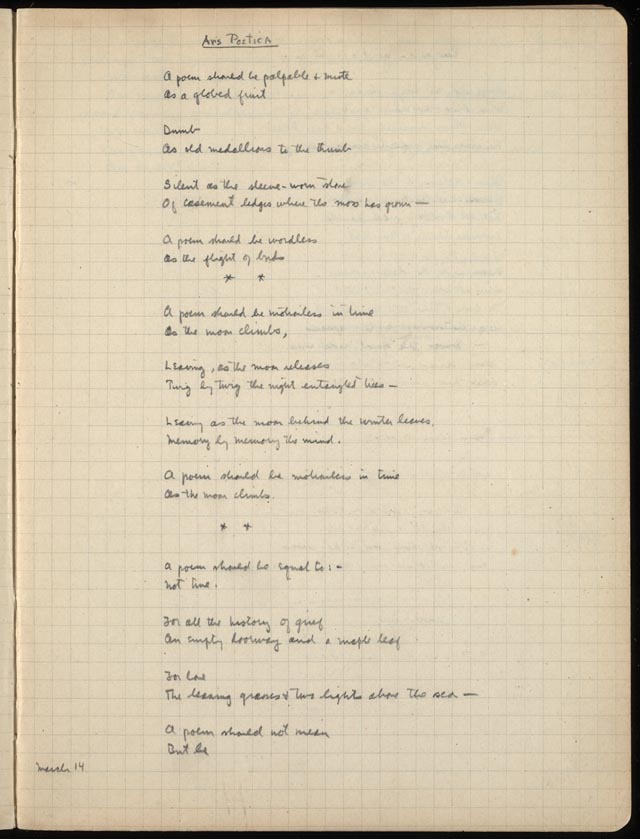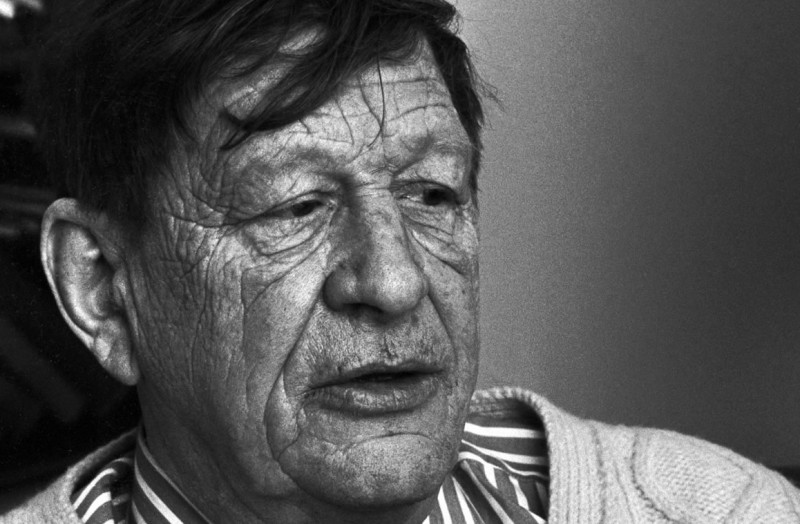From Wordsworth to Auden, a surprising number of famous poems have been blighted – or sometimes, improved – by printing errors, as Jonathan Law reveals…
In a post a while back Frank Key gave us his startling revisionist take on a well-known poem by Sylvia Plath:
In her mad poem ‘Daddy’, Sylvia Plath makes mention of “a bag full of God”. I have always taken this to be a misprint … I am as sure as eggs is eggs that what Plath originally wrote was “a bag full of Goo”. A slapdash printer made “Goo” into “God”, and the error has persisted for half a century …
I’m not enough of a Plath scholar to say whether Frank could be right, but the history of these things suggests that it’s far from impossible. Given Wilde’s dictum that “a poet can survive anything but a misprint”, you’d think that printers and publishers would take fierce pains to avoid even minor errata in poetry: but this just isn’t the case. If anything, radical, outrageous, sense-subverting typos are more common in verse than in the workaday medium of prose.
I suspect there might be two reasons for this. In the first place, many poems make their debut in tiny, no-budget magazines that can’t afford proof-readers and don’t send page proofs to the author; this is true even of new work by the Big Beasts of the poetry world. Errors introduced here are often perpetuated in later editions and can easily end up enshrined in the big posthumous Collected unless there is a thorough check of printed texts against MSS. Secondly, and rather more interestingly, there’s something about the language of poetry that makes it strangely pervious to error. In prose, any half-decent editor will query an incongruous word or a phrase that doesn’t seem to stack up in the ordinary way; some mistake surely. But in poetry, where odd collocations abound and everyday meanings get stretched and twisted like blu-tack? As long as a word passes spellcheck, then who’s to say that it’s (certainly) wrong? Editors with fidgety fingers need to remember the case of Richard Bentley, the great classical scholar who published his ‘corrected version’ of Paradise Lost in 1732; arguing that the blind poet had been let down by his scribes, Bentley expunged scores of sublime Miltonisms that troubled his 18th-century notions of sense and taste (obviously, the great Milton could never have written anything as illogical as “darkness visible” – what he wanted to say was “a transpicuous gloom”).
In the best poems, words are charged with a weird static and every stanza carries its tiny shock of delight. But if the language of poetry depends crucially upon surprise, then the word that slips into a poem by sheer fluke – through accident or inattention – will sometimes look and act as if it has a perfect right of abode. At times there may be a true serendipity – the word that was never meant bringing a rich strangeness or glamour. There’s a well-known example in Auden’s Journey to Iceland, which originally began:
And the traveller hopes: “Let me be far from any
Physician”; and the poets have names for the sea;
The citiless, the corroding, the sorrow
And North means to all: “Reject!”
However, when Auden received the galleys from Faber this had itself undergone a sea change: the second line now read
…and the ports have names for the sea
– a gift that the poet was happy to accept.
There’s a more dubious case in Wordsworth, in his otherwise not very interesting poem ‘To Miss Blackett, on Her First Ascent to the Summit of Helvellyn’. In the poem that he wrote in (probably) 1816 Wordsworth alluded to certain “choral fountains” that he imagined playing in certain caves in the mountains of the moon; come the collected edition of 1832, however, and these had become “coral fountains” – a freakish but not unappealing idea that fits well enough with the odd vein of fantasy in the piece. Very likely this originated as a mistake, but if so it’s one the poet decided to stick with in all subsequent editions appearing in his lifetime (Wordsworth was a fanatical reader of proofs, so it’s hard to believe that he simply missed it). Rather unimaginatively, all the great poet’s modern editors have opted to restore “choral” – the 1914 Oxford edition insisting sternly that “Wordsworth was not a writer of nonsense-verses” and opining that “coral fountains” is in any case a “vile phrase” (if anything, he should have written “fountains coralline”).
Something a bit similar happened in US editions of Yeats’s Collected Poems, which for many years printed this version of lines from his glorious poem Among School Children:
Plato thought nature but a spume that plays
Upon a ghostly paradigm of things;
Soldier Aristotle played the taws
Upon the bottom of a king of kings …
Miraculous stuff you might think, a signature piece of full-blown late period Yeats; but hold it right there – what Yeats actually wrote was “solider Aristotle” (solider, that is, than spumy old Plato). Having grown up with the ‘wrong’ version of this I can’t help preferring it: surely the line scans better and the epithet “soldier” is all the stronger for being unexpected (Aristotle was never himself a fighting man but certainly cheered on the exploits of his pupil, Alexander). Just possibly Yeats agreed: if he was aware of the error, then like Wordsworth he took no steps to put it right.
Prestigious collected editions seem oddly prone to this sort of thing. In terms of its typos and other minor errors, the most notorious Collected of modern times has to be the bestselling edition of Larkin’s poems published by Anthony Thwaite in 1988 (but don’t let that put you off: there are several important reasons why this book is better than either of the subsequent big Larkins). According to James Fenton, writing in the New York Times, one 12-line poem, ‘Long Sight in Age’, contains no less than three significant errors:
They say eyes clear with age,
As dew clarifies air
To sharpen evenings,
As if time put an edge
Round the last shape of things
To show them there;
The many-levelled trees,
The long soft tides of grass
Wrinkling away the gold
Wind-ridden waves—all these,
They say, come back into focus
As we grow old.
That is the poem as Thwaite prints it; but his own eyes were obviously far from clear. Larkin wrote “lost shape of things” not “last shape” and at the close of the piece there are no “waves” of any sort but rather weather vanes, glinting as they turn in the sun:
The long soft tides of grass
Wincing away, the gold
Wind-ridden vanes
The real surprise is how little any of this matters; Thwaite’s errors do nothing to detract from the chill beauty of Larkin’s poem or the coherence of its central conceit. “Last shape” brings the idea of mortality into a still more pitiless focus, and the lines about “wind-ridden waves” of grass seem finely characteristic of Larkin when he is working this lyrical-elegiac mode. As Fenton writes: “I can see it, the wind riding the grass in waves that seem to wrinkle. But it’s not Larkin.”

Sometimes, of course, a misprint will be more jarringly subversive of a writer’s intention. In the Collected Poems of Archibald MacLeish, for example, the editors somehow contrived to misprint two of the best-known lines in his very famous Ars Poetica:
A poem should be wordless
As the flight of birds.
Is it just the over-familiarity of this piece – cited ad nauseam in every discussion of modernist poetics – that gives me a sneaking fondness for the botched version?
A poem should be worldless
As the flight of birds.
That makes no sense at all, in context, and entirely subverts MacLeish’s insistence on the concrete, this-worldly nature of poetry (“A poem should be palpable and mute/ As a globed fruit” and so on). But all the same, that “worldless flight” is beguiling – a rush of the airiest Shelleyan romanticism where no one would look for it.
And there perhaps you have it. There’s something of the romantic sublime about a good misprint, something that makes it a little bit harder to think straightforwardly about the relation of word to world (or indeed, of goo to God).













On my shelves, both the Collected Poetry (edition of 1956, printing 1979) and an anthology have “solider Aristotle”, which in any case scans better.
I believe that “the mystic chords of memory” in the last paragraph of Lincoln’s first inaugural address from time to time end up as “mystic cords”.
Did you catch it?
As if to further support Law’s “Misprints” notes, the Author Profile credits him with “The Whartons of Winchester,” but the wee thumbnail of the book’s cover locates the Whartons at Winchendon.
Good grief. Well spotted Karen – that’s been like that for ages.
What a fascinating piece. I do like ‘Soldier Aristotle’ and Wordsworth’s coral. Shakespeare’s early printed texts are, of course, riddled with misprints, and they have been worked over by a scholarly industry, which sometimes introduces misprints and misreadings of its own. For years we have enjoyed Horatio’s description of old Hamlet who ‘smote the sledded Pollacks on the ice’ (the early texts have ‘sledded Pollax’). Jonathan Bate, editor of the RSC Shakespeare, will have none of these Pollacks. His version has Horatio saying:
‘So frowned he once when, in an angry parle,
He smote the steelèd pole-axe on the ice.’
‘Steeled’, you see, is used in Elizabethan English for something, particularly a weapon, tipped or tempered with steel. But you have to be an expert in arms and armour, or have the nous to search the corpus of Elizabethan literature for the right term, to know this. I’m sorry to lose the ‘sledded Pollacks’, for whom I had a certain affection, but I think Bate is probably right. One can imagine old Hamlet grabbing one of his bodyguard’s staff weapons and banging it down on the ice to make his point with force.
I deliberately steered well clear of Shakespeare for this piece, as the subject is so large and tangled! Apart from a few obvious literals, it’s almost impossible to say definitively that anything in Shakespeare is a misprint as (i) there is no autograph copy and (ii) the relative authority of the printed texts is so warmly disputed.
That said, I would be sorry to lose the “sledded Polacks”, who live in the mind’s eye quite vividly considering the brevity of the reference and its dubious authenticity. Perhaps I’m just imagining it, but I seem to remember an old film version (Olivier’s?) in which you actually see the Polacks, in their sleds, on the ice, and Old Hamlet frowning as he smites them. Or am I just getting distracted by the battle on the ice in Alexander Nevsky?
A still more famous — and miraculous — example of this sort of thing is the phrase “a’ babbled of green fields” in the account of Falstaff’s death in Henry V. It’s difficult to think of a more haunting, pathos-drenched phrase in the whole of Shakespeare – but it’s really very likely that we owe it to an 18th-century editor named Theobald, a man widely despised in his own time as a pedant and a poetaster. The printed text actually has “a table of green fields”, which no one has been able to make much sense of (Alexander Pope surmised that it might be a misplaced stage direction referring to a property hand named Greenfield). Theobald’s guess is plausible as well as beautiful, but it’s hard to say much more than that.
Another odd thought is that the lovely name Imogen may derive from a misprint. The name is found only in the First Folio Cymbeline, whereas all Shakespeare’s sources and several contemporary documents have “Innogen”. (I was reminded of this by @nigellalawson in her tweet linking to this piece – yes, I really am read by goddesses.)
Ah, that would explain the sudden Everest in our hit stats.